National Cheng Kung University (NCKU) has established and continuously updated, between 2021–2025, a series of policies covering the management of laboratory and campus hazardous waste, including chemical, biological, solid, and liquid waste, to ensure proper treatment in compliance with regulations. These policies stipulate: regular reporting and collection of solid and liquid waste, classification, packaging with designated containers, and proper labeling; biomedical waste must be stored in red bags with specific tags; chemical waste and empty containers must be cleaned and classified by chemical compatibility; and the “Regulations for Wastewater Management in Buildings and Laboratories” were enacted in line with the Water Pollution Control Act and the Waste Disposal Act. In addition, the NCKU Environmental Protection and Safety Center promotes a “Zero Waste Carbon Neutral” disposal system. All related rules are publicly available, and training sessions and briefings are provided to strengthen compliance among staff and students, demonstrating the university’s transparency and commitment to sustainability in hazardous waste management.
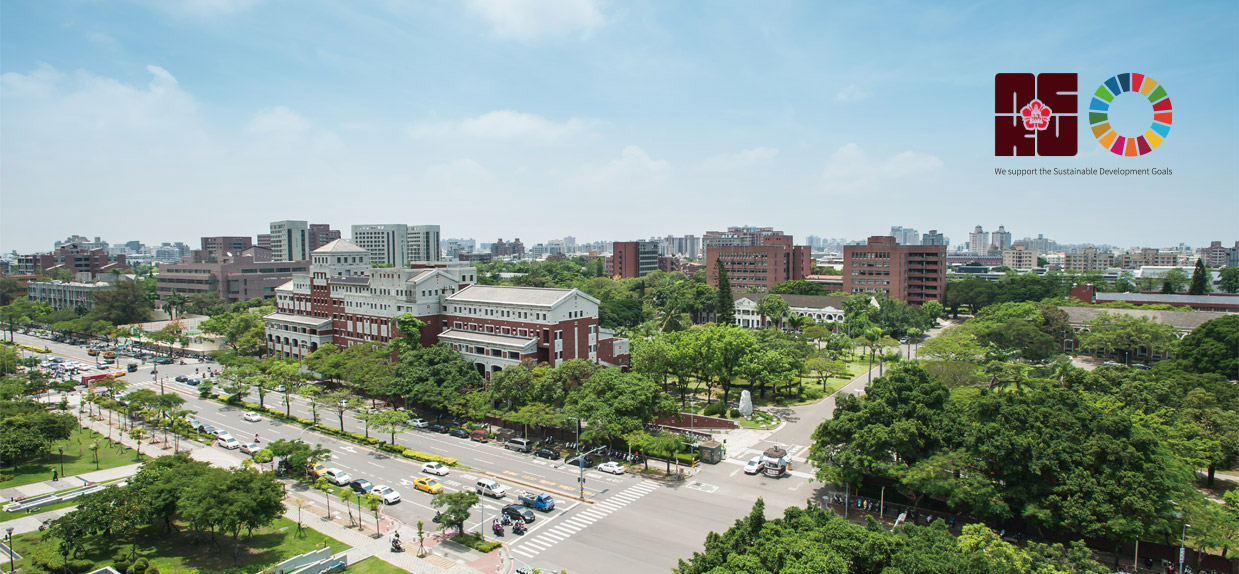
Policy waste disposal - hazardous materials
12.2.3
SDG12

Policy waste disposal - hazardous materials NCKU has policies on waste disposal, covering hazardous materials.
- Laboratory Waste Management of NCKU
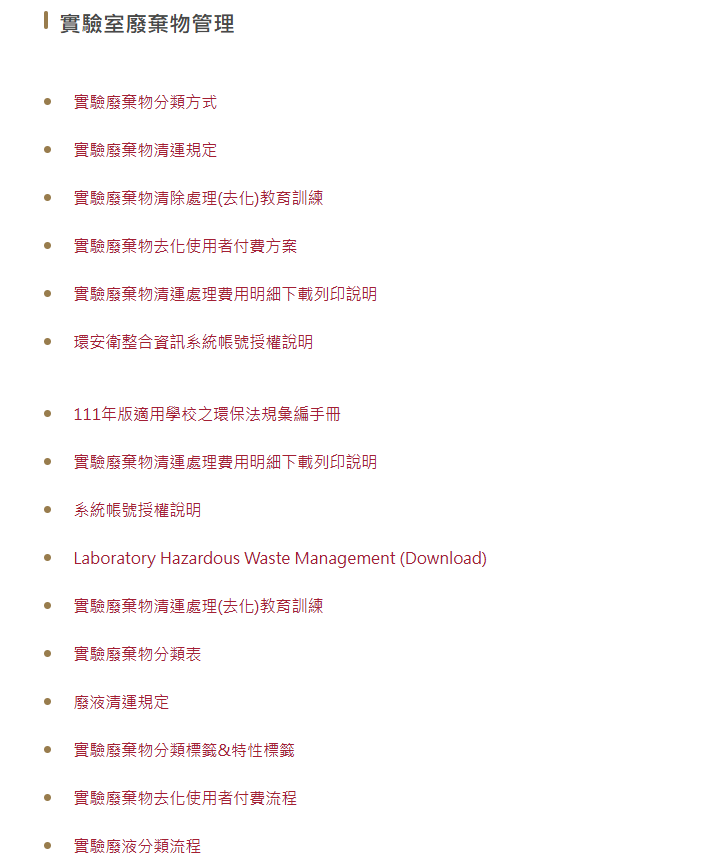 NCKU has established a comprehensive “Laboratory Waste Management” system, covering waste classification methods, disposal regulations, decontamination training, user-pay schemes, and downloadable fee details. In line with the 2022 Compiled Environmental Protection Regulations Handbook, the system ensures legal compliance. The university also provides an English resource, Laboratory Hazardous Waste Management, and authorizes accounts on the Environmental Safety and Health platform to facilitate faculty and students in filing disposal applications and keeping records. This policy guarantees that hazardous waste management meets environmental and safety standards, reinforcing campus sustainability and risk management.
NCKU has established a comprehensive “Laboratory Waste Management” system, covering waste classification methods, disposal regulations, decontamination training, user-pay schemes, and downloadable fee details. In line with the 2022 Compiled Environmental Protection Regulations Handbook, the system ensures legal compliance. The university also provides an English resource, Laboratory Hazardous Waste Management, and authorizes accounts on the Environmental Safety and Health platform to facilitate faculty and students in filing disposal applications and keeping records. This policy guarantees that hazardous waste management meets environmental and safety standards, reinforcing campus sustainability and risk management.- Regulations for the Collection and Transportation of Solid Waste
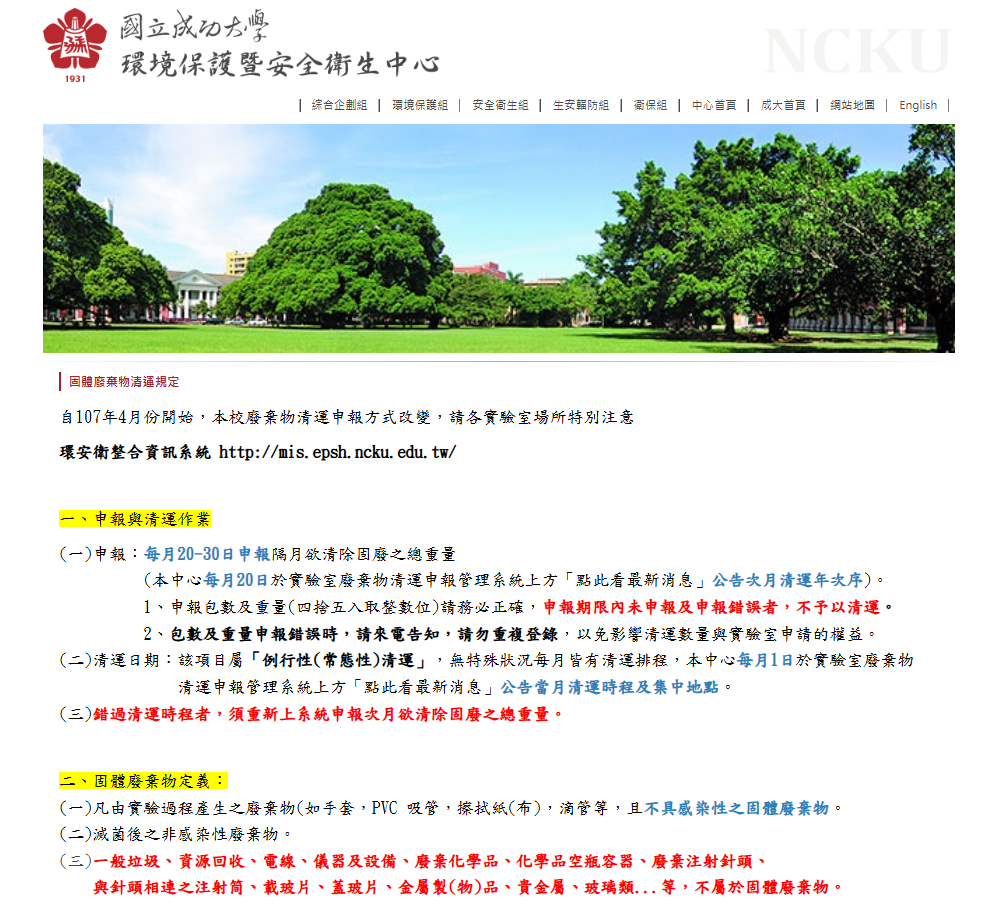 Since 2018, NCKU has adjusted its waste disposal reporting system, requiring laboratories to submit applications and manage processes through the Environmental Safety and Health Integrated Information System. The reporting period is set from the 20th to the 30th of each month, while disposal takes place on the 1st of every month according to the announced schedule. Solid waste includes non-infectious laboratory waste such as gloves, PVC pipettes, wipes, and droppers, but excludes general trash, recyclables, chemical containers, needles, metals, and glass. This regulation ensures clear waste classification and transparent procedures, enhancing campus environmental safety and compliance management.
Since 2018, NCKU has adjusted its waste disposal reporting system, requiring laboratories to submit applications and manage processes through the Environmental Safety and Health Integrated Information System. The reporting period is set from the 20th to the 30th of each month, while disposal takes place on the 1st of every month according to the announced schedule. Solid waste includes non-infectious laboratory waste such as gloves, PVC pipettes, wipes, and droppers, but excludes general trash, recyclables, chemical containers, needles, metals, and glass. This regulation ensures clear waste classification and transparent procedures, enhancing campus environmental safety and compliance management.- The NCKU Environment Resource Management Research Center
The NCKU Environment Resource Management Research Center has established a comprehensive waste treatment system that integrates incineration, physicochemical methods, and high-temperature plasma melting to effectively handle hazardous waste generated from laboratories and across the campus. By repurposing by-products for paving materials or artistic creations, the system promotes resource circulation. This approach not only reduces the environmental impact of waste but also aims for “zero waste and carbon neutrality,” demonstrating the university’s innovative practices and social responsibility in sustainable development and hazardous waste management.
- Classification of Laboratory Waste
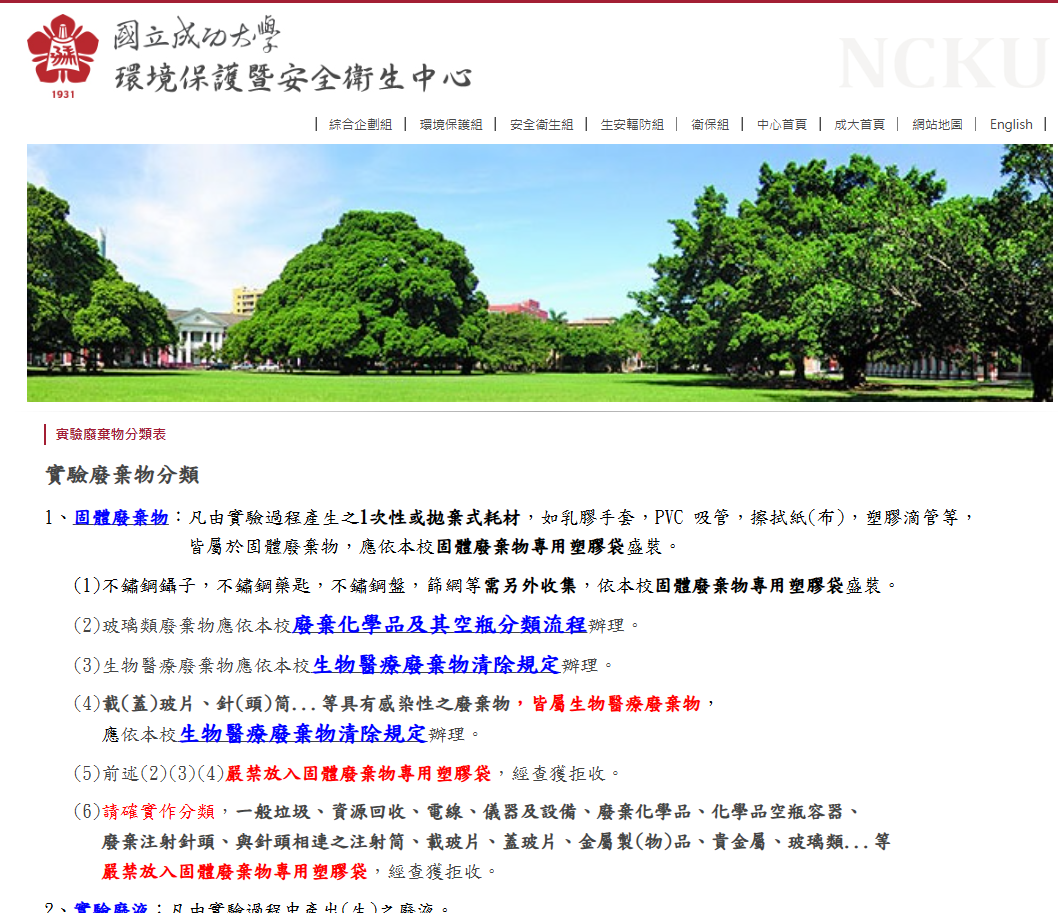 NCKU has established regulations on “Laboratory Waste Classification,” dividing waste into two main categories: solid waste and laboratory liquid waste. Solid waste, such as gloves, pipettes, wipes, and plastic droppers, must be collected in designated plastic bags and further classified into categories such as metals, glass, and biomedical waste. Mixing with general trash is strictly prohibited. Laboratory liquid waste is divided into organic and inorganic types, which must be stored separately according to their properties—for example, acidic/alkaline waste, ammonia-based waste, oxidizing agents, or sulfide-containing waste—to prevent hazardous reactions or risks.
NCKU has established regulations on “Laboratory Waste Classification,” dividing waste into two main categories: solid waste and laboratory liquid waste. Solid waste, such as gloves, pipettes, wipes, and plastic droppers, must be collected in designated plastic bags and further classified into categories such as metals, glass, and biomedical waste. Mixing with general trash is strictly prohibited. Laboratory liquid waste is divided into organic and inorganic types, which must be stored separately according to their properties—for example, acidic/alkaline waste, ammonia-based waste, oxidizing agents, or sulfide-containing waste—to prevent hazardous reactions or risks.- Waste Collection and Transportation Regulations
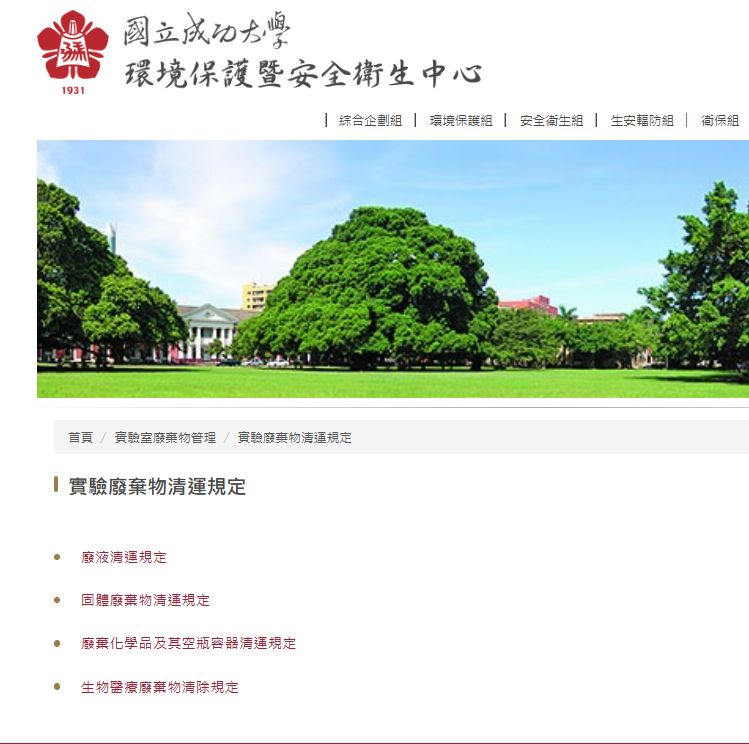 NCKU has established “Laboratory Waste Disposal Regulations,” which set specific rules for different types of waste, including: liquid waste disposal, solid waste disposal, disposal of discarded chemicals and empty containers, and biomedical waste disposal. The system requires each unit to properly classify and report waste according to its nature, with unified management and tracking through the Environmental Safety and Health platform. This ensures that the disposal process complies with environmental protection laws, reduces laboratory safety risks, and reinforces the university’s commitment to campus sustainability and environmental responsibility.
NCKU has established “Laboratory Waste Disposal Regulations,” which set specific rules for different types of waste, including: liquid waste disposal, solid waste disposal, disposal of discarded chemicals and empty containers, and biomedical waste disposal. The system requires each unit to properly classify and report waste according to its nature, with unified management and tracking through the Environmental Safety and Health platform. This ensures that the disposal process complies with environmental protection laws, reduces laboratory safety risks, and reinforces the university’s commitment to campus sustainability and environmental responsibility.- 2023 Campus Laboratory Waste Disposal Briefing
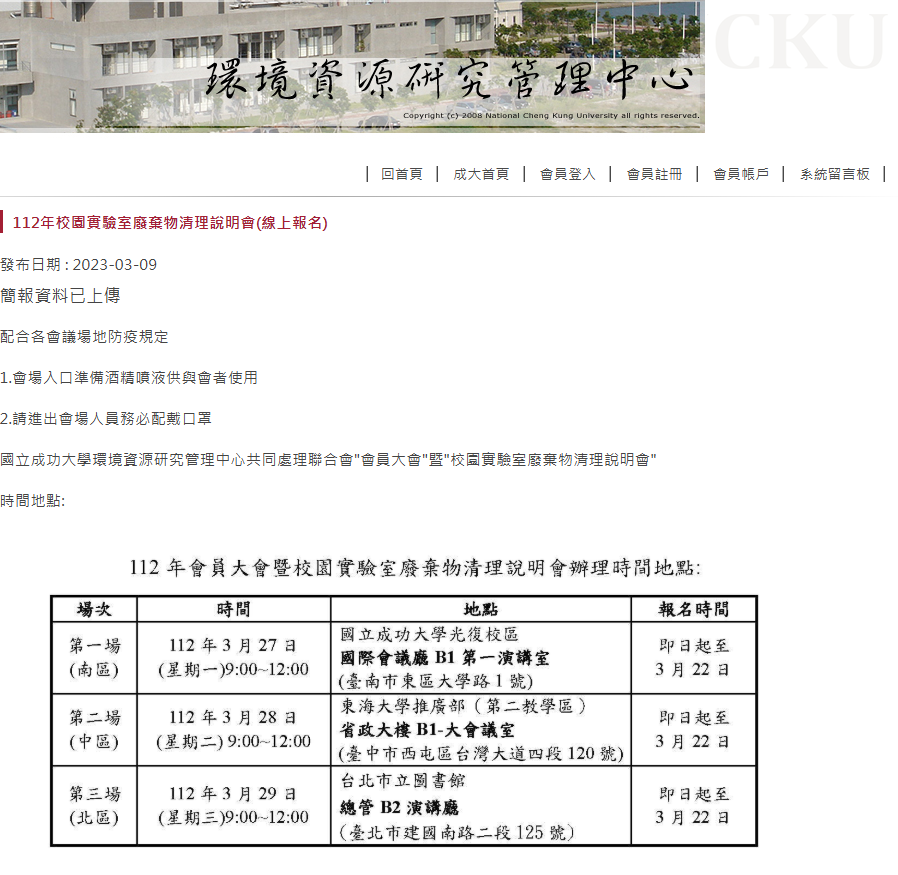 In 2023, NCKU held the “Campus Laboratory Waste Disposal Briefing Sessions.” The Southern session took place on March 27 at NCKU’s Kuang-Fu Campus International Conference Hall, the Central session on March 28 at Tunghai University’s Sheng-Cheng Building, and the Northern session on March 29 at the Taipei Public Library. Each session was held from 9:00 a.m. to 12:00 p.m., with registration closing on March 22. The event aimed to inform relevant personnel both within and outside the university about laboratory waste management and disposal procedures, reinforcing compliance and safety to ensure that waste treatment meets environmental protection standards and legal requirements.
In 2023, NCKU held the “Campus Laboratory Waste Disposal Briefing Sessions.” The Southern session took place on March 27 at NCKU’s Kuang-Fu Campus International Conference Hall, the Central session on March 28 at Tunghai University’s Sheng-Cheng Building, and the Northern session on March 29 at the Taipei Public Library. Each session was held from 9:00 a.m. to 12:00 p.m., with registration closing on March 22. The event aimed to inform relevant personnel both within and outside the university about laboratory waste management and disposal procedures, reinforcing compliance and safety to ensure that waste treatment meets environmental protection standards and legal requirements.
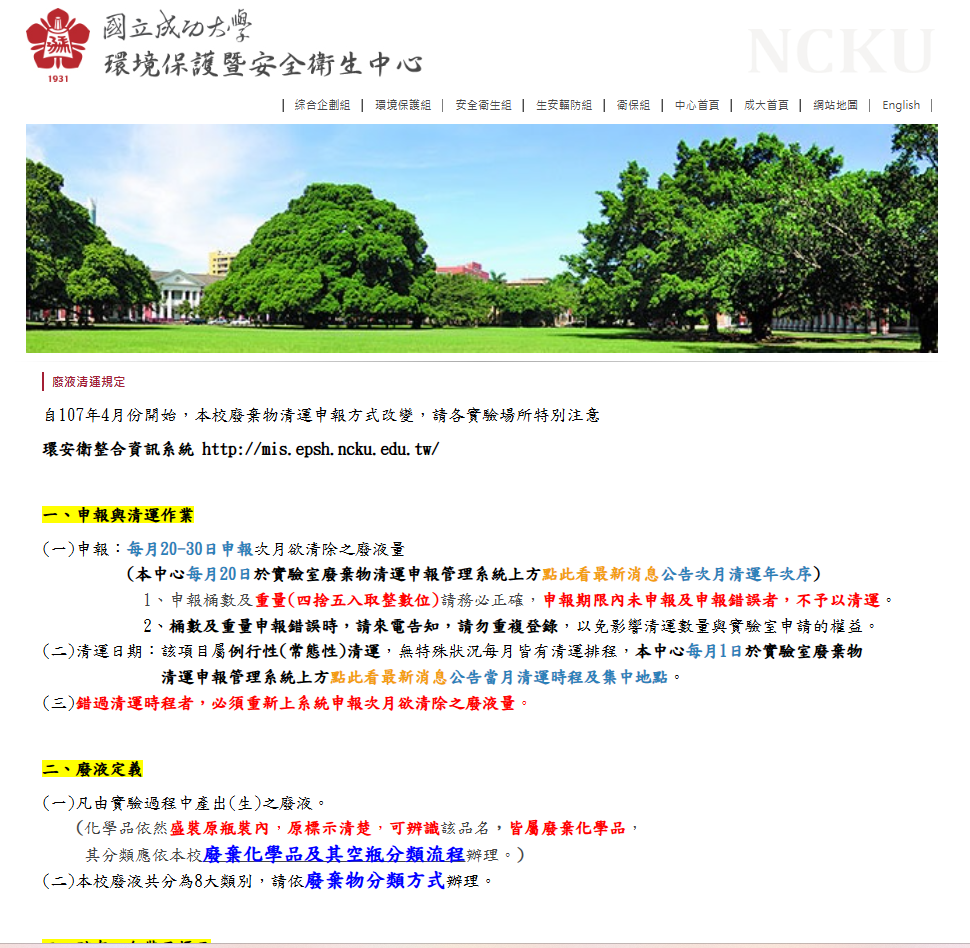 NCKU has established “Liquid Waste Disposal Regulations.” Since 2018, laboratories are required to submit applications through the Environmental Safety and Health Integrated Information System. The reporting period is from the 20th to the 30th of each month, with disposal scheduled on the 1st of the following month; late submissions must be refiled. Liquid waste is defined as liquid by-products generated during experiments. If chemicals remain labeled and in intact packaging, they are classified as discarded chemicals and must follow the corresponding procedures. Campus liquid waste is categorized into eight groups and managed according to the “Waste Classification Guidelines.” This system strengthens the safety and compliance of liquid waste management while reducing environmental risks on campus.
NCKU has established “Liquid Waste Disposal Regulations.” Since 2018, laboratories are required to submit applications through the Environmental Safety and Health Integrated Information System. The reporting period is from the 20th to the 30th of each month, with disposal scheduled on the 1st of the following month; late submissions must be refiled. Liquid waste is defined as liquid by-products generated during experiments. If chemicals remain labeled and in intact packaging, they are classified as discarded chemicals and must follow the corresponding procedures. Campus liquid waste is categorized into eight groups and managed according to the “Waste Classification Guidelines.” This system strengthens the safety and compliance of liquid waste management while reducing environmental risks on campus.
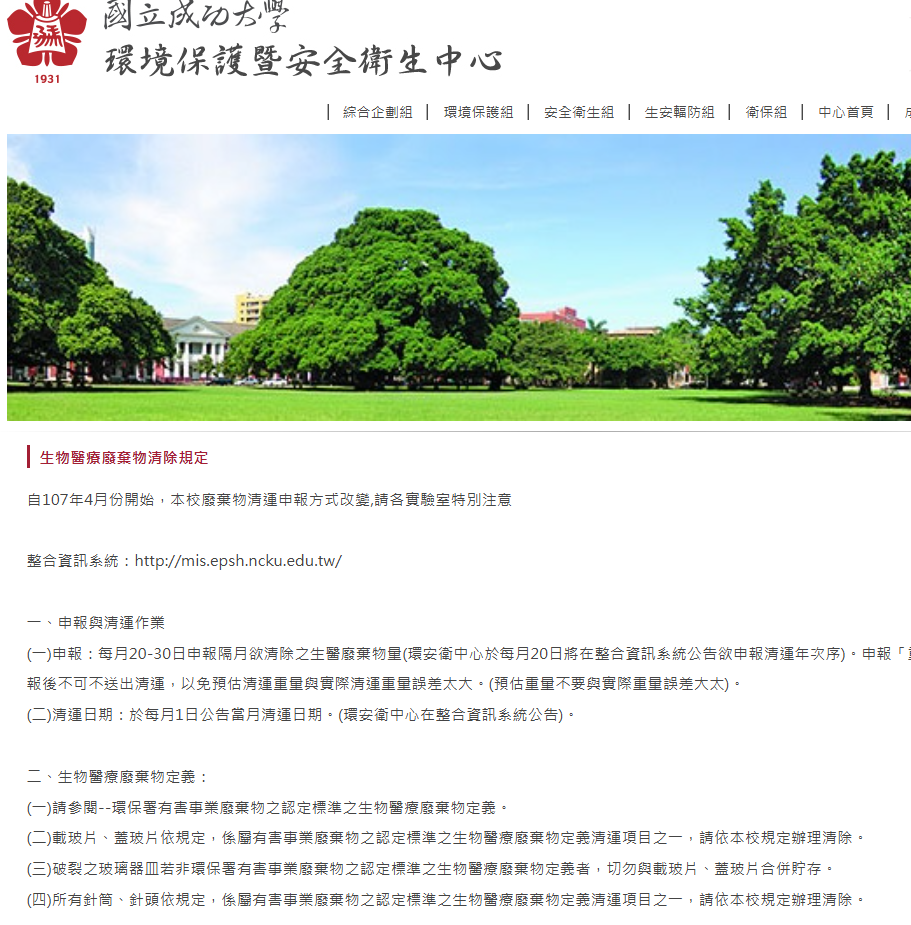 NCKU has established the “Biomedical Waste Disposal Regulations.” Since 2018, reporting and management have been carried out through the Integrated Information System. The reporting period is from the 20th to the 30th of each month, with disposal conducted on the 1st of the following month. Biomedical waste includes experimental animal carcasses, infectious slides and needles, and broken glassware, all of which must be classified and handled according to the regulations. The university provides red designated plastic bags for collection, which must be properly labeled; the use of other containers is strictly prohibited. Violations will be subject to accountability under the Waste Disposal Act, and any related fines must be borne by the offending unit or department.
NCKU has established the “Biomedical Waste Disposal Regulations.” Since 2018, reporting and management have been carried out through the Integrated Information System. The reporting period is from the 20th to the 30th of each month, with disposal conducted on the 1st of the following month. Biomedical waste includes experimental animal carcasses, infectious slides and needles, and broken glassware, all of which must be classified and handled according to the regulations. The university provides red designated plastic bags for collection, which must be properly labeled; the use of other containers is strictly prohibited. Violations will be subject to accountability under the Waste Disposal Act, and any related fines must be borne by the offending unit or department.
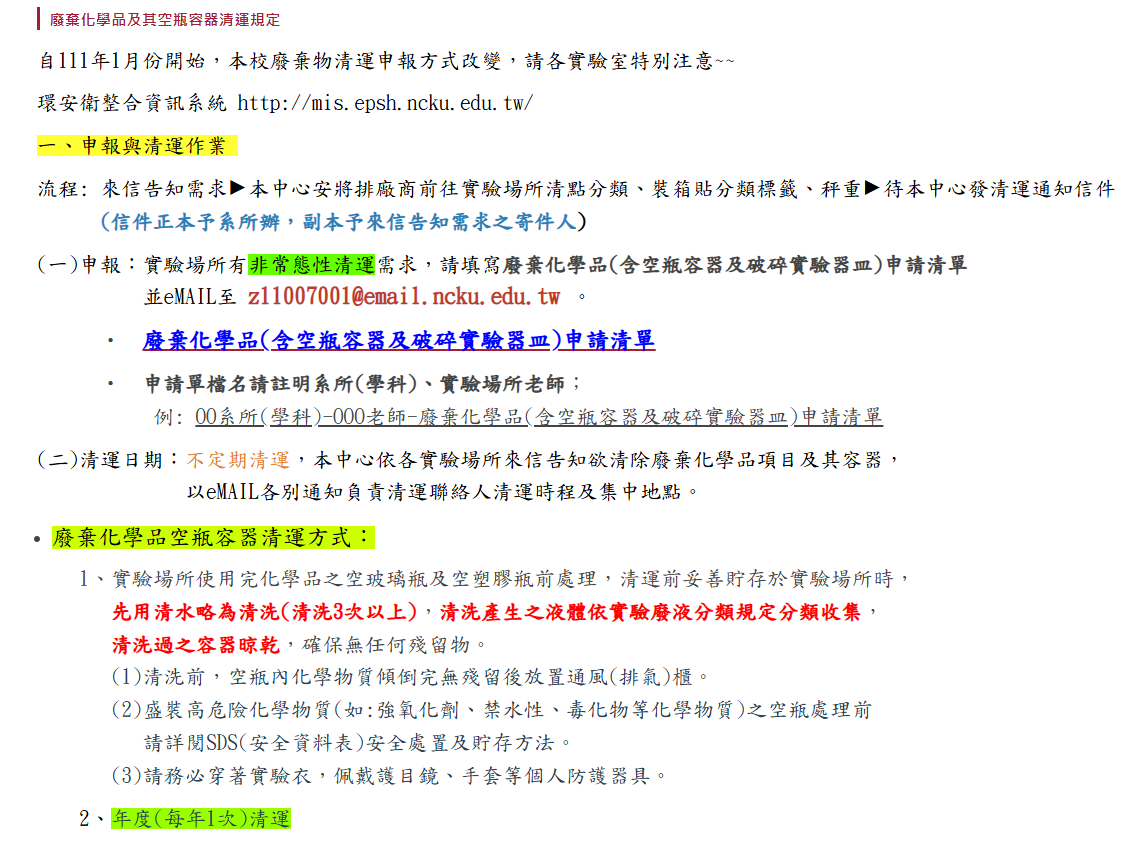 NCKU has established the “Regulations for the Disposal of Discarded Chemicals and Their Empty Containers.” Since 2022, reporting has been carried out through the Integrated Information System. Laboratories are required to complete the “Application List for Discarded Chemicals (including empty containers and broken laboratory ware)” and submit it via email. Disposal dates are arranged irregularly and announced accordingly. The process requires that containers be rinsed with water at least three times, with the resulting waste liquid collected according to classification rules, and that containers be kept dry. Glass and plastic bottles must be properly stored in designated containers. All handling must comply with safety regulations to ensure no residual chemicals remain and to safeguard laboratory safety.
NCKU has established the “Regulations for the Disposal of Discarded Chemicals and Their Empty Containers.” Since 2022, reporting has been carried out through the Integrated Information System. Laboratories are required to complete the “Application List for Discarded Chemicals (including empty containers and broken laboratory ware)” and submit it via email. Disposal dates are arranged irregularly and announced accordingly. The process requires that containers be rinsed with water at least three times, with the resulting waste liquid collected according to classification rules, and that containers be kept dry. Glass and plastic bottles must be properly stored in designated containers. All handling must comply with safety regulations to ensure no residual chemicals remain and to safeguard laboratory safety.
- NCKU Regulations for Wastewater Management in Buildings and Laboratories
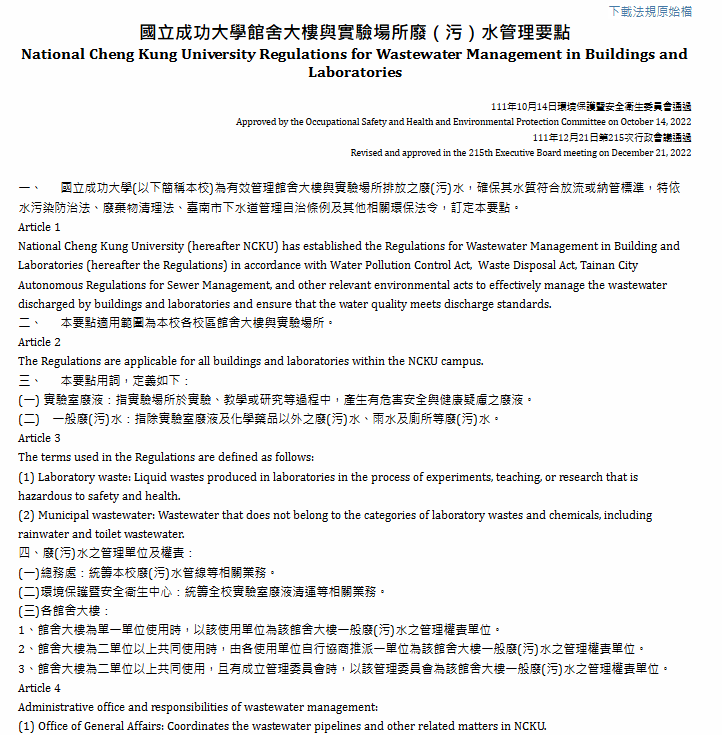 NCKU, in accordance with the Water Pollution Control Act, the Waste Disposal Act, and the Tainan City Sewerage Management Regulations, has formulated the “Regulations for Wastewater Management in Campus Buildings and Laboratories” to ensure that wastewater discharge meets water quality standards. The regulations apply to all university buildings and laboratory facilities, and define categories including laboratory wastewater (wastewater from experiments that may pose hazards or health concerns) and general wastewater (such as rainwater and sewage from restrooms).
NCKU, in accordance with the Water Pollution Control Act, the Waste Disposal Act, and the Tainan City Sewerage Management Regulations, has formulated the “Regulations for Wastewater Management in Campus Buildings and Laboratories” to ensure that wastewater discharge meets water quality standards. The regulations apply to all university buildings and laboratory facilities, and define categories including laboratory wastewater (wastewater from experiments that may pose hazards or health concerns) and general wastewater (such as rainwater and sewage from restrooms).- Laboratory Hazardous Waste Management
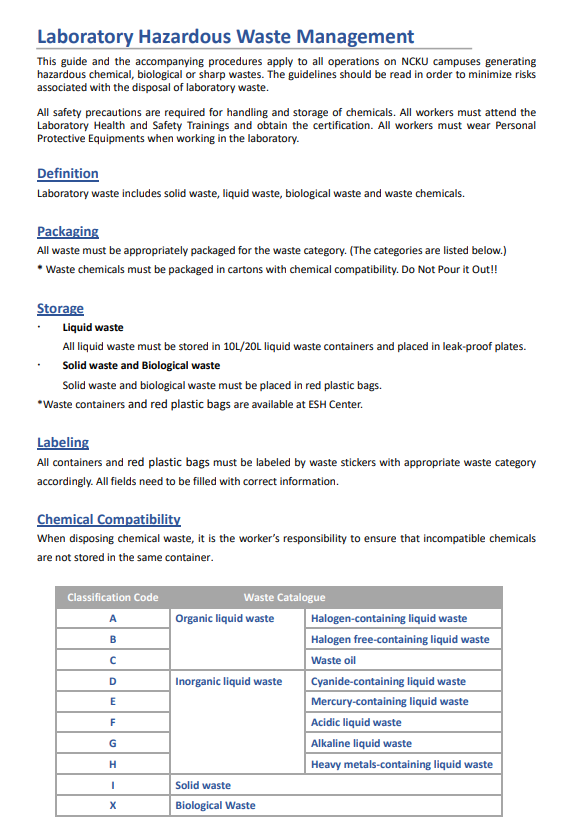 NCKU has established “Laboratory Hazardous Waste Management” regulations, applicable to all laboratory operations that generate chemical, biological, or sharp hazardous waste on campus. The content covers: definitions (including solid, liquid, biological, and chemical waste); packaging methods (proper packaging by category, with no arbitrary disposal); storage requirements (liquid waste in designated containers, solid and biological waste in red plastic bags); labeling management (correct waste labels must be attached); and chemical compatibility rules (incompatible liquid waste must not be mixed). It also provides classification codes, such as organic, inorganic, acidic/alkaline, heavy metals, and biological waste. These measures ensure laboratory safety and support environmental sustainability on campus.
NCKU has established “Laboratory Hazardous Waste Management” regulations, applicable to all laboratory operations that generate chemical, biological, or sharp hazardous waste on campus. The content covers: definitions (including solid, liquid, biological, and chemical waste); packaging methods (proper packaging by category, with no arbitrary disposal); storage requirements (liquid waste in designated containers, solid and biological waste in red plastic bags); labeling management (correct waste labels must be attached); and chemical compatibility rules (incompatible liquid waste must not be mixed). It also provides classification codes, such as organic, inorganic, acidic/alkaline, heavy metals, and biological waste. These measures ensure laboratory safety and support environmental sustainability on campus.